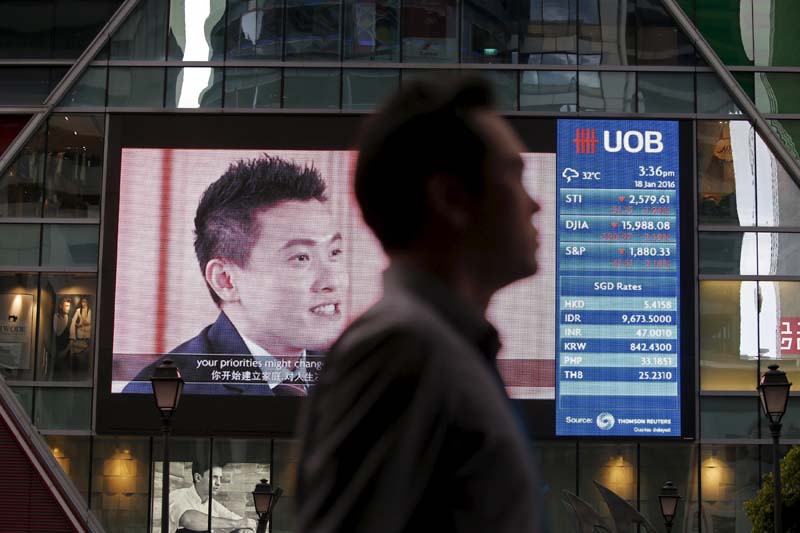Asia gains as China shares surge on stimulus hopes
TOKYO: Asian shares were mostly higher on Tuesday as Shanghai stocks surged after data pointing to slower Chinese economic growth fanned stimulus hopes.
Spreadbetters expected Europe to follow Asian shares' lead and forecast a higher open for Britain's FTSE, Germany's DAX and France's CAC.
China's economy grew 6.8 percent in the fourth quarter from a year earlier, Tuesday's gross domestic product (GDP) data showed, the slowest growth since 2009. Industrial output in December rose 5.9 percent from a year earlier, compared with forecasts for a 6.0 percent increase.
MSCI's broadest index of Asia-Pacific shares outside Japan was up 0.8 percent, rebounding from a four-year low touched earlier.
Volatile Shanghai shares, which descended to a 13-month low on Monday, swerved in and out of the red before gaining more than 2 percent.
"Economic weakness has been largely priced in," said Gu Yongtao, strategist at Cinda Securities.
"This year, exports and consumption could remain weak. Investment, another driver of growth, really depends on government's spending on infrastructure."
While the Chinese data produced no negative surprises, it did confirm growth in the world's second-biggest economy was indeed slowing.
Concerns about the health of the Chinese economy has been a primary theme this year, stirring global growth concerns and buffeting markets worldwide. Against this background, gains by many Asian bourses remained modest.
South Korea's KOSPI was up 0.3 percent and Malaysian stocks rose 0.2 percent. Singaporean stocks and Japan's Nikkei were nearly flat.
"While headline growth looks fine, the breakdown of the figures points to overall weakness in the economy," said Zhou Hao, senior emerging markets economist at Commerzbank in Singapore, regarding the Chinese GDP numbers.
"All in all, we believe that China will experience a 'bumpy landing' in the coming year."
The Australian dollar, often used as a proxy for China-related trades, was up a modest 0.3 percent at $0.6886 . The Aussie was still firmly within reach of a seven-year low of $0.6827 touched last week amid a rout in commodity-linked currencies.
The Hong Kong dollar touched a new four-year low of 7.8045 versus the dollar, taking it to the lower end of its trading band.
Under a three-decade old currency peg regime, the value of the Hong Kong dollar is allowed to fluctuate within a band of 7.75 to 7.85. Capital outflows in the wake of recent volatility in the Chinese stock and currency markets have buffeted the Hong Kong dollar.
As risk appetite thawed slightly, the US dollar nudged up 0.3 percent to 117.64 yen after slipping last week to a 4-1/2-month low of 116.51 versus the safe-haven Japanese currency.
The euro dipped 0.1 percent to $1.0886.
In commodities, Brent crude was up 1.5 percent at $29.00 a barrel, rebounding from recent sharp losses.
Still, Brent remained in proximity of a 13-year low of $27.67 hit on Monday on worries about the return of additional Iranian crude to an already oversupplied market.
International sanctions on Iran were lifted at the weekend, removing an obstacle to one of the world's biggest oil producing nations. Tehran on Monday immediately issued an order to ramp up production.
US financial markets were closed on Monday for Martin Luther King Day.






